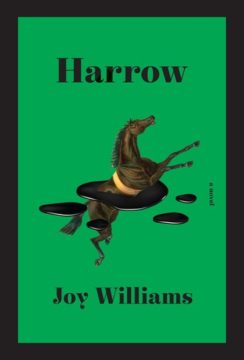Justin Taylor in Bookforum:
 The Quick and the Dead, which is not set in Florida but in the West, is one of the weirdest, funniest, darkest novels you’ll ever read. It lost the 2001 Pulitzer Prize to The Amazing Adventures of Kavalier & Clay, thus fulfilling the promise of Luke 4:24. Williams’s new novel, Harrow, is Quick’s spiritual successor, perhaps even sequel, taking up that novel’s concerns and amplifying them by the full twenty years it took her to write it. Harrow reminds me very much of Denis Johnson’s Fiskadoro and Cormac McCarthy’s The Road, but, with apologies to the boys, it’s better than both of their novels put together. Harrow belongs at the front of the pack of recent climate fiction, even as it refuses the basic premise (human survival is important) and the sentimental rays of hope (another world is possible!) that are the hallmarks of the genre. This novel doesn’t care who you vote for or if you recycle. It’s not bullish on green tech jobs or sustainable meat. It would leave Steven “Things Are Getting Better” Pinker and Matthew “One Billion Americans” Yglesias writhing in shame if guys like them were capable of reading novels or feeling shame. Harrow is a crabby, craggy, comfortless, arid, erudite, obtuse, perfect novel, a singular entry in a singular body of work by an artist of uncompromised originality and vision. For all of its fragmentation and deliberate strategies of estrangement, Harrow feels coherent and complete, like a single long-form thought or a religious epiphany. It’s also funny as hell.
The Quick and the Dead, which is not set in Florida but in the West, is one of the weirdest, funniest, darkest novels you’ll ever read. It lost the 2001 Pulitzer Prize to The Amazing Adventures of Kavalier & Clay, thus fulfilling the promise of Luke 4:24. Williams’s new novel, Harrow, is Quick’s spiritual successor, perhaps even sequel, taking up that novel’s concerns and amplifying them by the full twenty years it took her to write it. Harrow reminds me very much of Denis Johnson’s Fiskadoro and Cormac McCarthy’s The Road, but, with apologies to the boys, it’s better than both of their novels put together. Harrow belongs at the front of the pack of recent climate fiction, even as it refuses the basic premise (human survival is important) and the sentimental rays of hope (another world is possible!) that are the hallmarks of the genre. This novel doesn’t care who you vote for or if you recycle. It’s not bullish on green tech jobs or sustainable meat. It would leave Steven “Things Are Getting Better” Pinker and Matthew “One Billion Americans” Yglesias writhing in shame if guys like them were capable of reading novels or feeling shame. Harrow is a crabby, craggy, comfortless, arid, erudite, obtuse, perfect novel, a singular entry in a singular body of work by an artist of uncompromised originality and vision. For all of its fragmentation and deliberate strategies of estrangement, Harrow feels coherent and complete, like a single long-form thought or a religious epiphany. It’s also funny as hell.
More here.
